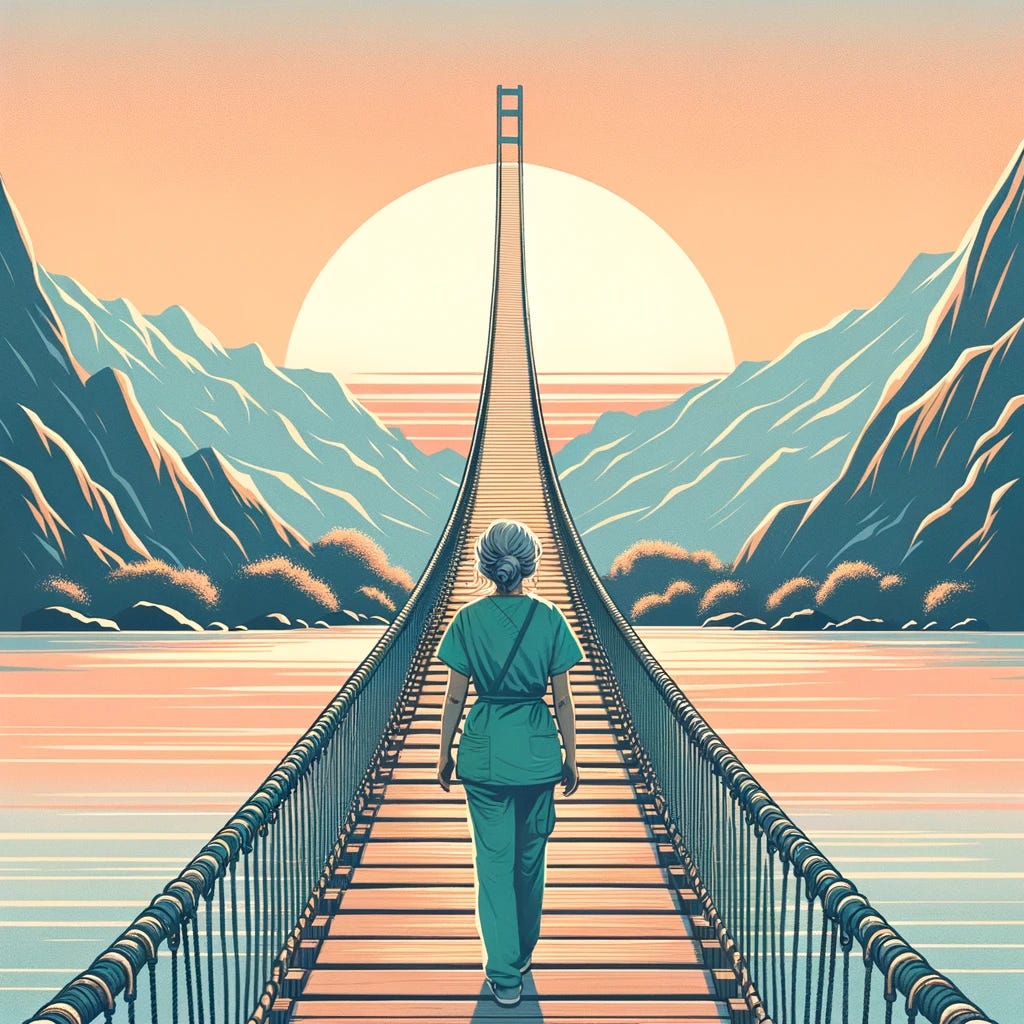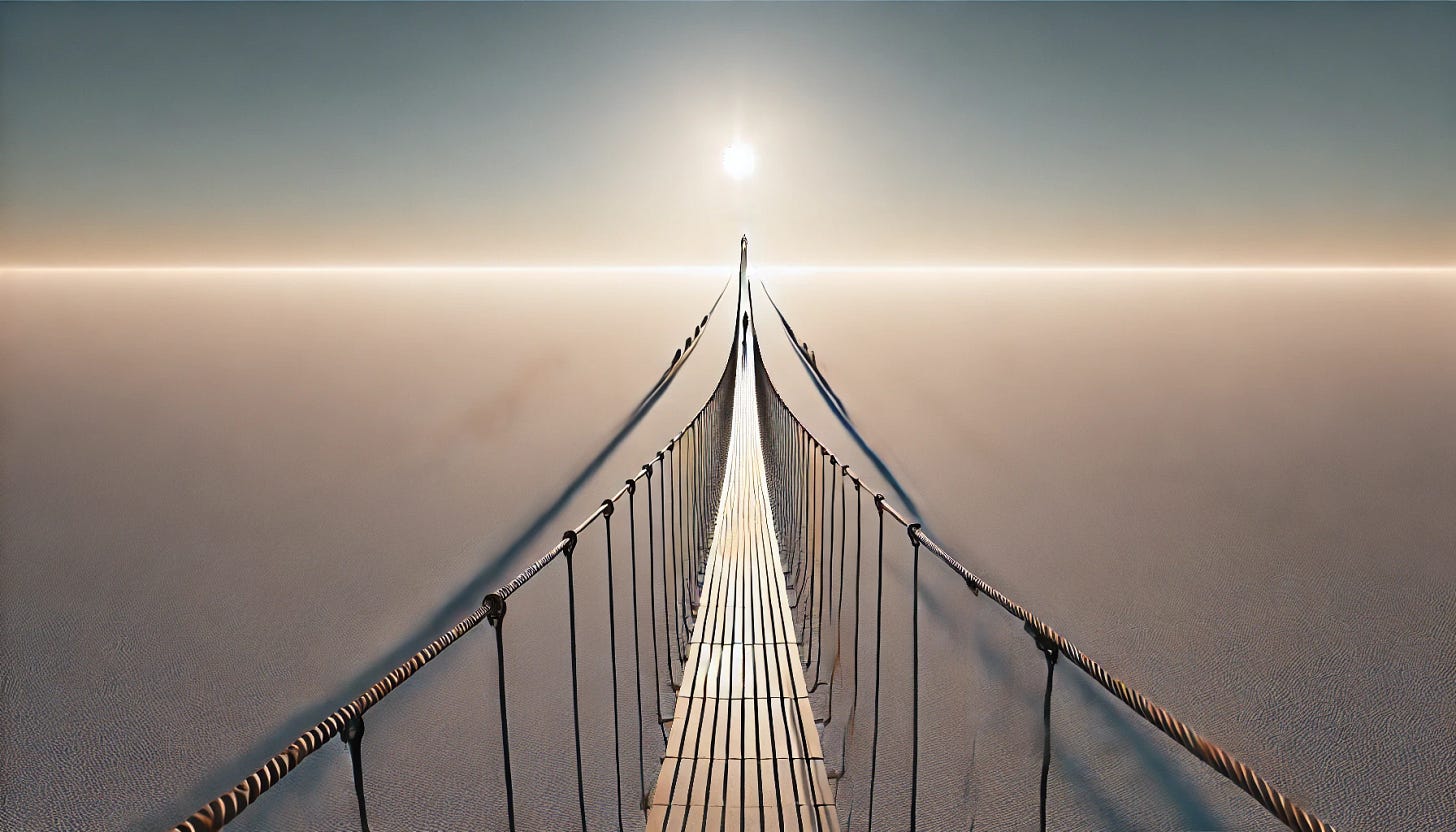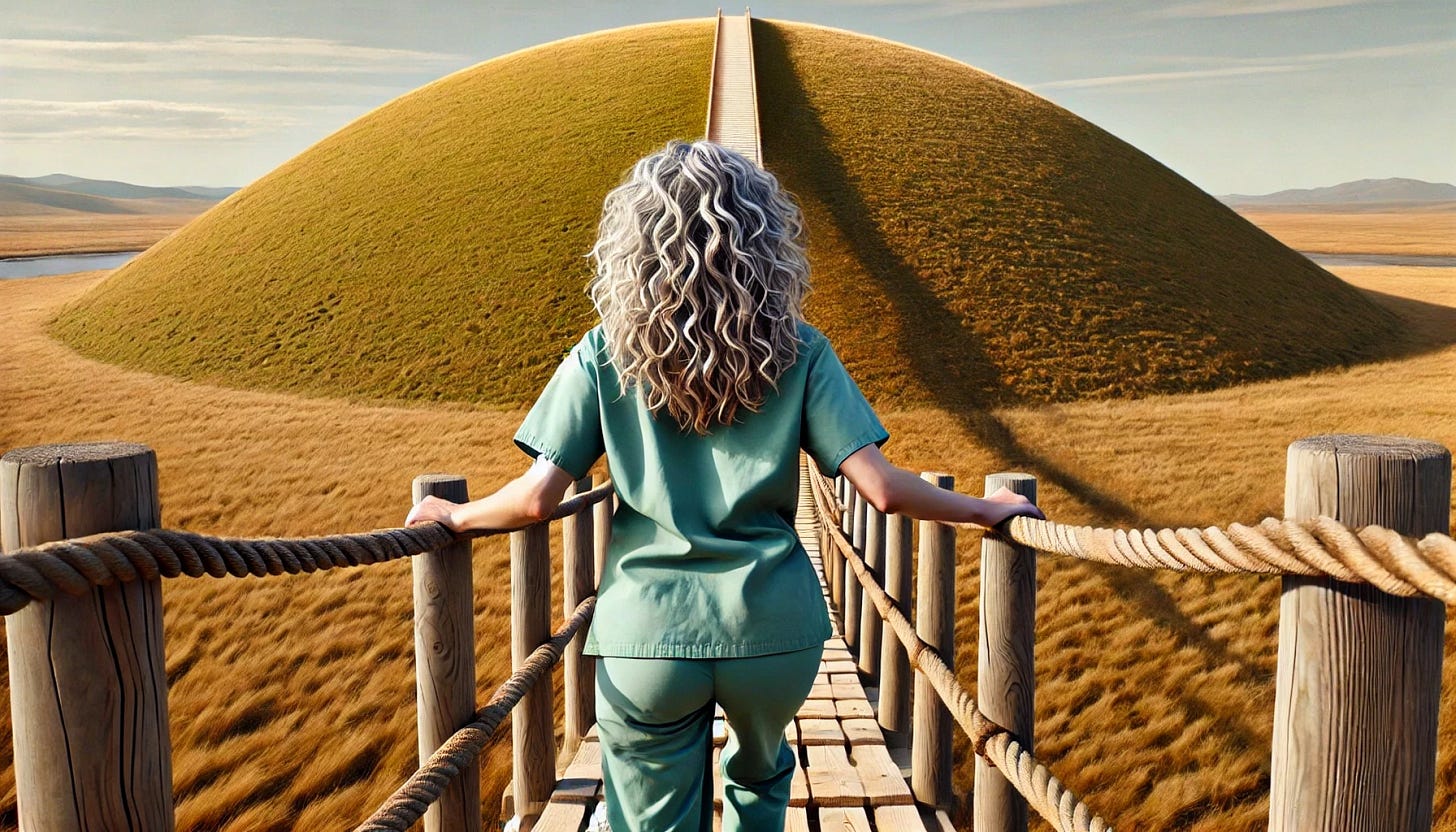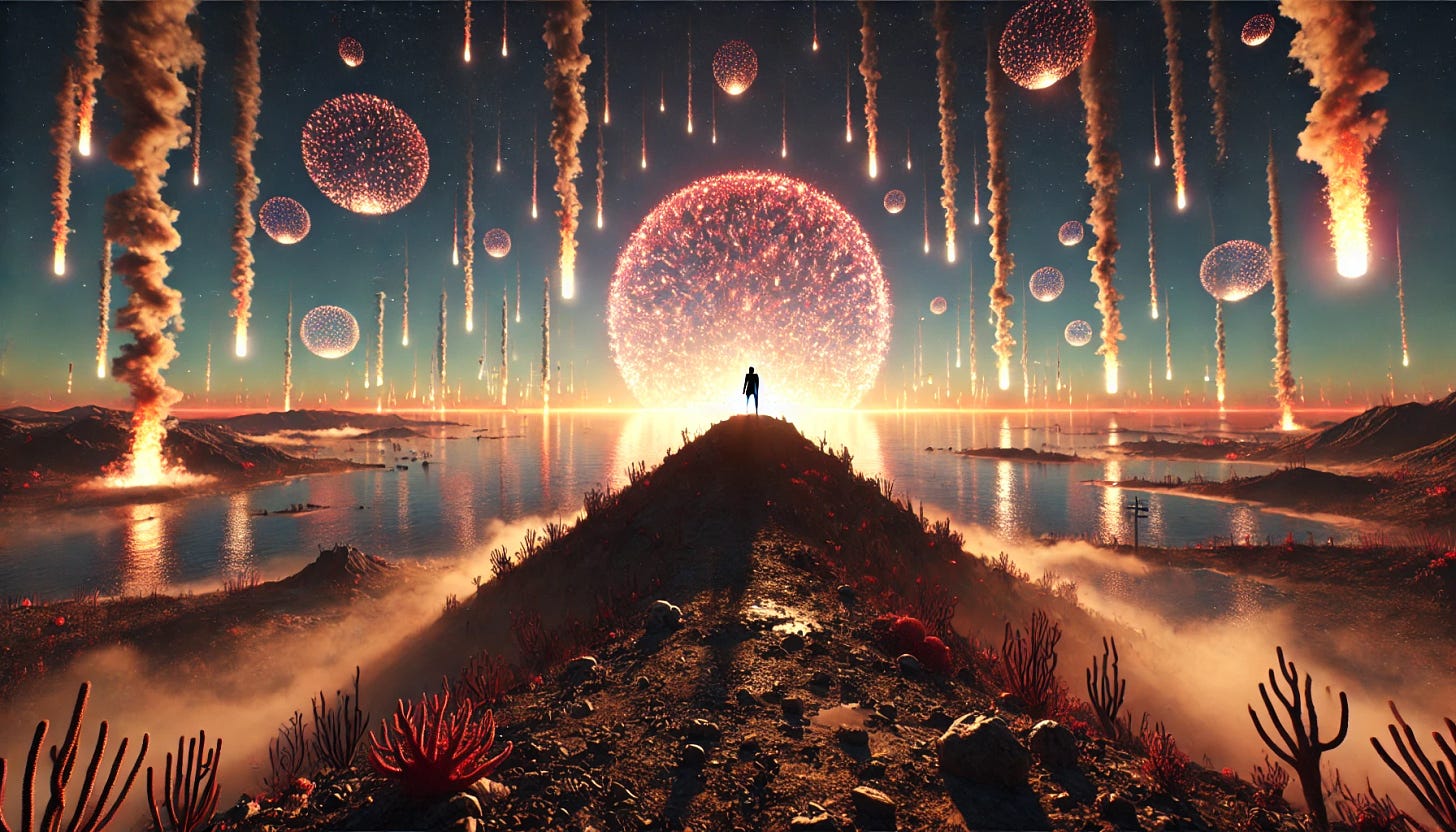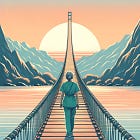Thank you to my stalwart readers for joining me on my inaugural Substack voyage. This is the conclusion of Only by the Grace of the Wind, a slightly surreal novel presented in twelve serial chapter instalments.
Please don’t forget to comment below. I would love to hear from you.
Feeling lost? You can get your bearings by visiting the Table of Contents
“I understand by this bright light the meaning of liberty. It is liberty to grow as the tree grows in the field of energy of its seed. Only by the grace of the wind is the bark free on the waters”
—Antoine De Saint-Exupery, Flight to Arras
My inner universe has spread itself thin. Gone now are the braided memorial dramas spilling forth on an endless stage. Perhaps it was the final trip down memory lane that did it, overstuffed as it was with the detritus of an unswept mind. What began as an explosion of recollection, my own and my dead father’s, has trickled into a whispering stillness.
It was a denouement I could have predicted. Surprise surprise, my parents died again. In a decidedly cruel touch, they were literally torn from each other’s arms, rocketed across an abyss of space and time, and tucked into their death beds, a hospital cot and a sagging old couch. Some redemptive symbolism would have been nice. A whimsical final kiss, maybe. A sage homily. My mother dancing once more, hands twirling, lithe and ecstatic, a leonine last stand against the mets splintering the bones beneath her paper-thin skin. Lies, in other words, pablum for the grief-addled daughter who would rather forget that her mother slipped away with a grimace on her face and a hand at her throat and her demented father tumbled off a ladder.
Until just a few moments ago, the algorithm, or whatever is driving this lunatic bus, had not given two shits about my anguish or longing or despair. But credit where credit is due. After it broke my heart, it took me somewhere nice, a place suffused with only the best memories. I am alone now, here on the summit ridge of Bonneville’s highest peak, Mount Sugarloaf. Its knife-edge ridge opens onto a flat promontory that could sleep four fearless campers tethered to the redrock.
I recline across a long, flat hunk of sandstone. Tacked to the edge with thick wooden nails is the entrance to a very narrow bridge, a hopscotch of trunk-wide planks and loops of latticed rope stretching across a fathomless gorge. A brave woman might venture onto this makeshift bridge, a hand on each corded support to steady her shrieking nerves, and edge out to the other side. But not me. Not now.
If inertia comes to visit, may she stay for forty years. I would welcome her into my redrock sanctuary with open arms and a clap on her broad, rippling back. Even the beleaguered Israelites were given some respite in the desert, where, if memory serves, God rained delicious mana from the sky to sustain their weary bodies and boost their brittle morale. These wanderers in whose name we continue to wander, in whom, according to my father’s old rabbi, I continue to wander, in whom I suppose my father also wandered, in a memory realm of his own making.
The logician who lives behind my eyes insists my ongoing odyssey is merely a stochastic happening, a grief reaction, a mesh of random eruptions in my embattled synapses. And yet, the poet in me wonders whether this impulse is itself a defence against the inscrutable, the gnostic, the aching pull of entropy. If it is all meaningless, just neural garbage, then maybe I could let it evanesce, like the dream mists that clear each morning with the brushing of teeth, and move forward, out into a brand new future.
But what kind of life would that be? The willful blinkering of numinous experience. No, this is happening, it’s really happening. It’s happening to me, and here I am, basking like a lizard on a sandstone mattress in a vacant memory.
How long has it been since I had to grit my teeth and submit to a turning? It is a silly question. Time has no shape here. It is like a drifting, seeking arrow shaft in the abyssal vacuum of space. And yet, I remember everything, every waystation on my journey, every surge of sadness, every ache of dread and grief for lost things and saudade for the things that never again can be. Surely, it is not merely a mechanical malfunction, a wraith haunting a mourning brain. Tell me there’s something more.
Every now and then, the rope bridge sways. In the still air of this warm Bonneville summer day, I cannot help but read the breezeless flutter of the slack cable handholds as a kind of invitation, insinuated, not made, a gambit, maybe, in a game I will play, come hell or high water.
I filibuster for some time, eyes closed, body slack, and then, with a sigh, I flop off my rock and approach the bridge. I crouch before the first crosspiece and press on it. The ropes creak softly, like a polite hiccup. Lightly, I step onto the wood and grasp the rope supports. The bridge bobs slightly, but it does not dip. Once I am onboard, so to speak, the horizon shifts such that I can no longer glimpse the connecting peak to which the bridge had been tethered.
Now, there is only an endless chain of flat wooden planks. I shift to look back at Mount Sugarloaf, but of course, its dusty redrock peak has vanished, too. In its place, a daisy chain of wooden slats and interminable lengths of rope extend out to the horizon line. Is there a metaphor here? If only I could consult my father the pamphleteer. What had he written? We are woven into the fabric of an endless field of patterns, interconnections, and interrelations unfurling across the universe. Considered askance, it has the patina of truth, or something true enough, though perhaps it is just the oversubtle reasoning of a soul who sees too clearly and feels too much.
I peer down through the corded lattice coupling the wooden planks. Where one might expect to find a valley stream, a pine forest, even a low-slung industrial facility, I can discern only featureless white space. Up above, the same view, the absence of things, oblivion. All that is left is a very narrow, derelict rope bridge on which I am trapped.
I make my way across lazily, ploddingly, timing my steps with the nauseating bridge swings, making a little game of it. Every third step, I balance on one foot. Every fifth, I straddle two planks and do a shallow lunge.
In the world of solids, I would be fearful of falling. Then again, in the world of solids, there would be something to fall onto. Something to fall through. Some ancient warning my lizard brain would metabolize into abject terror. But here, there is just this very narrow bridge on which I find myself hopelessly alone, so why not pirouette and sing and cry and dance and make the best of it?
For all the gurus’ pronouncements, all we really know about life is that it is agonizingly brief. As children, our wonder-dipped horizons stretch out endlessly in all directions. Each day is a lifetime of play, in which the vibrations of existence, not just ours, but also the ants we find in the woods and the sprawling, achingly inventive sagas we concoct in our little brains, undulate in the rhythm of the rest of things. And then, slowly, insidiously, as our bodies go the way of Mr. Hyde, doors of perception close, hours begin to race. Subjectivity burgeons and, like a solar eclipse, blots out the sun whose light had once illuminated everything.
In our teenage belligerence, we defy the dagger of time. We parry it with fantasies of significance, invincibility, narrative centrality. And meanwhile, all around us the world is changing, parents are aging, time careens forward. Soon it will foreclose youth, just as we awaken to its brevity. If we are lucky, in our clunky, dewy-eyed retrospectives, the earliest days glisten within the honeyed amber of treasured memory, like sacred artifacts in the museum of life. If we are not, such memories take on a different cast. They freight the psyche with an insuperable, monstrous burden, an inner cudgel turned on the self to punish a body already battered and splinter a mind that pines for a haven that was never built.
Whatever the case, time barrels ineluctably forward. Time gives and time takes. With every passing day, a handful of sand slips through the universe’s fingers in honour of our infinitesimal narratives, these micro-dramas of becoming. Human time is finite, and so its finitude is precious beyond imagining.
Is that not what my father wrote in his letter? A murmured promise of certain death. Everything is always and forever becoming, Karina, he reminded me. And we are all careering headlong toward the end, the final extinguishment, if not for Earth, then certainly for our fragile human bodies spiralling deathward. And so we must be scrupulously, fiercely protective of this interim we call life, this candle illuminating a small corner of a darkened room for the briefest of instants, or a narrow bridge, perhaps, across the vast chasm of nonexistence. And as my father saw in an apparent moment of lucidity before the curtain of dementia fell, the only thing that really matters is what we choose to do with the time that animates us.
There is an elephant on the bridge with me, pink-skinned, speckle-trunked, rearing up on its hind legs, bucking against the bounds of metaphor.
“What does it say about you, Karina, that this is what you’ve chosen to do with your time?” it trumpets.
There is no question that I have given much of it to the gobblers, like protection money to the Casa Nostra. Go to school or you will suffer. Do well or you will suffer. Respect the order of things or you will suffer. Know your place or you will really suffer. Start low, go slow, ignore the princelings and princesses on the golden escalator. Keep your head down, nose to the grindstone. When you bow, let your eyelashes graze the earth. Ignore the dust and left-behinds and float-to-the-tops. Do not acknowledge the edifice of cruelty and greed and hubris that we serve like little lemmings until we’re shuffled off into the abyss. If they stomp on your head, it is merely the price of admission, a due everyone must pay to join the land of the living. Even the leader of a street gang was once jumped in.
Do I sound like a crackpot?
Life is a very narrow bridge. You tread it step by step, plank by plank. Memory is a map of your footfalls, sandal-prints in the desert sand. Should you need to retrace your path, all you have to do is find one of these imprints, a trace time has left in the terrain of memory. It is no wonder so many mystics and philosophers and seekers throughout human history have built monuments to it, enshrined their remembrances in mind and edifice, so sacred are these maps of time, always slipping away.
Even as the monster of forgetting tore at the scaffolding of my father’s memory city, ripping out fire hydrants, erasing whole forests, sweeping away footprints with a stiff-bristled broom, something remained, something transcendent, preternatural, something inexplicable. I was granted access to the terrain of his memory. How, I still can’t say, but without this impossible transposition, my golden gate, his memories would have vanished without a trace.
Is it a gift, then, this harrowing, madcap odyssey through the intertwining memories of father and daughter, like the filigreed rope nets connecting the planks of this suspension bridge? These are some of the lineaments of memory, whole years bunched together, a tangle of moments, days that telescope into a thousand tomorrows, loves come and gone, spirits lost and gained. It is like a book I keep in my consciousness, written, as my father would remind me, in the language of time.
Life is a very narrow bridge. We totter across it until we can no longer. Maybe someone throws us off the deck, or a cable ruptures, or we simply stop in the middle and refuse to go on. Life is a narrow bridge no matter how far you make it, and you cross on its terms.
The bridge on which I now tread, quite literally, seems to elongate before my eyes, waxing like some psychedelic vision. On impulse, I grab one of the slack support cables and use its flaccid ballast to jettison myself into the oblivion below. But something unseen, like two firm hands gripping my shoulders, plants my feet firmly on a wooden plank. The ropes on either side of the very narrow bridge ramify and interlace into a knitted web that now towers above me, immuring me on this bridge on which I had previously been more or less free.
Enraged, I yank off one of my shoes and hurl it through one of the reticulations, which dilates as wide as a hula hoop to allow my effete throw its completion. The shoe sways and whistles as it sails into the abyssal whiteness below. Now, I have just one shoe. No other materializes on my foot. And so, after a petulant moment, in which I stubbornly refuse to continue, I shuffle along once more, across the very narrow bridge.
“What do you want from me?” I cry into the void.
But of course, there is no answer. Just the very narrow bridge and a one-shoed Karina. I doff the other and stuff it in the netting connecting two of the infinite wooden planks. The bridge is not cold or rough under my bare feet, but smooth and balmy, like Rhiannon’s parents’ rear deck in the spring.
I bolt forward, like a sprinter propelled from offset blocks. The suspended bridge sways with my every bounding footfall, moaning in protest, but I persist. Arms pumping, legs burning, even here in this liminal place between memory and dream, rocketing toward some conclusion, something beyond this very narrow bridge. But nothing happens. My legs tire. My lungs slam on the brakes. And I come to a pathetic stop, hunched over and panting like a fat dog, nearly toppling over as the bridge comes to a pendulous equilibrium once more.
Life is a very narrow bridge. And sometimes you cross it in spite of yourself. Some spectral handler nudges you forward, slapping your hands when they clench into fists, pinching your lips shut when you, in your folly, resolve to bellow in surrender. We must all cross the very narrow bridge, you see, for it is not just memory that is written in the language of time, but your life, which time ghostwrites with or without you. Perhaps that is why the old rabbi was prattling on about the Jews wandering through the desert. Out of Egypt they went, out into the wilderness, into the brave and new, never to return. Did we ever arrive? Do any of us ever arrive? Or is the wilderness the point? The going forward, eyes open, mind clear, souls bare, alone in a sense, but travelling with other echoes, moving toward The Mystery together.
The narrow bridge is thick with ghostly pilgrims and arcing waves of memory cresting over their heads, the records of the past that always and forever lean over the present. Someone said to me once that history is the best predictor of the future. Before he died, my father offered a corollary, a sort of souvenir brought to trembling life through the course of my own tumbling journey. He wrote that everything everywhere is always becoming. We roil, we shift, we change, we unfold, and we transform until we do not any longer. The joy of memory, then, inheres not just in the record itself, but the experience of returning, living in the past in the present for some of our precious moments that never again will be.
But we must not forget, life is a very narrow bridge. And so we must keep going. We must keep moving, grinding, aching, laughing, fighting, fidgeting, submitting, breathing, and suffering until we cannot, or we do not, any longer. And one cannot live only in memory, can they? One cannot live backward while time rushes forward, at first like a tributary trilling alongside an idyllic meadow, and then with more and more urgency, until finally, its thunderous torrent blurs years into months, months into days, days into hours. No, one cannot live forward while looking back, aching for what came before, what, according to the laws of saudade, never again can be.
This is not a moral injunction, not some two-bit evangelism. Or maybe it is, but turned inward, not out, a realization, here, on this very narrow bridge, that no matter what has happened to me, no matter what has come before, no matter where I’ve come from and how I got here, no matter what was done to me and what I have done to myself, right now, my life is still, and always has been, mine. It is my story that is woven through memory, tied together with the moments, the hours, the days, the years of my life.
And they are mine, these memories, strung along a very narrow bridge. Whether I look backward or live forward, time is leaving its traces. And woe betide she who lives in memory, whether by choice or, shall we say, mystical occurrence. Linger here too long, and distortions ripple through the fabric of recollection. Details are lost. People are flattened. Moments are dilated and embroidered and freighted with a mountain of associations. This is the beauty of memory, of its recollection. Like dreams, its terrain is infinitely textured and as vast as the universe.
If life is a narrow bridge, memory is no place to live. Consider the source. Barefoot, I make my way across my own very narrow bridge, reaching for the horizon line that seems fixed in the cloudless blue sky.
Blue sky? It takes me a moment to recognize this bit of providence. Out of the featureless whiteness, a sky has emerged, blue and bright, with its own phosphorescent sun, in whose incandescence I can see just a little further down the very narrow bridge.
Out in the distance now, two figures appear at the horizon. From my vantage, they are so brightly illuminated as to be divine visions. The bridge stiffens as we converge on each other, they from there and I from here. In their approach, I have the sense they are toting the horizon with them, giving the illusion of a waning bridge.
When they do finally come into view, a couple in middle age, I am at once surprised and relieved to see them once again. They are vital and bright, not quite young, but not old either. The bridge seems to widen just enough to accommodate their twin approach. My mother comes right up to me and cups my chin in her hand so she can sew a kiss in the hollow between my nose and cheek. My father leans forward to rest his lips on my forehead. They greet me as parents do, as they used to, with an embrace and a quick, approving up-and-down glance.
I open my mouth to speak, but I find I have no voice. My father taps his throat and shakes his head. They each grab one of my hands, and the very narrow bridge swells silently to allow for a trio’s passage where only one could tread before. And so we walk together, synchronizing our steps on each of the now much larger wooden planks.
Every now and then, I catch one of their gazes and smile. They squeeze my hands and plant another kiss and stop to pull me into a long, tight embrace. I experience the whole, vast spectrum of emotions. I laugh at this incongruous event, this lovely bit of incredibly good fortune. I ripple with gratitude, treasuring their warm hands in mine, still perfused with blood. I wail silently into the abyss at what I know what must be coming, our eventual, and perhaps final, separation.
It takes some time for me to realize that they are changing as we walk. My father’s umber face is becoming more lined. His wide-set, mossy eyes are somehow smaller, more wizened. And his stalwart gnomon nose twitches every now and then with decided befuddlement. My mother’s hair, silver at first, eventually falls out. Her glowing olive skin turns wan and sallow. She begins to tremble and flag. My father releases my hand and jogs to her side. We prop her up, both of us, her arms slung over our shoulders, our hands at her jutting iliac crests, which we grip like handles. Even as my father, quite aged now, looks around like a bewildered sheep, his mien is upright, back straight. His old man arm does most of the work supporting my cachectic mother.
We hobble along the very narrow bridge until we cannot. Both my bewildered father and moribund mother tap my forearms. My mother smiles, her gums ragged and crimson, and gestures ahead, at the rest of the very narrow bridge, which spills out ahead of me like a ribbon. I turn to my father, who nods solemnly. They pull me into one final embrace, and I begin to weep in heaving pantomime. When they release me, I drop to my knees before them. In a desperate plea, an aching and magical begging, I hold up my hands in a prayer gesture.
I sob silently, there before my dying parents, and prostrate myself. “Don’t go,” I mouth. “Don’t go again.”
They weep, too, but they nevertheless gesture toward the horizon with quivering, unyielding hands outstretched.
They want me to go, to keep going, to go on without them, out into the great unfolding. Their stories have ended, but mine is still being written. More memories to weave, and a full skein of time with which to write them. They want me to continue along the very narrow bridge of life. And I must go alone.
In the end, I suppose, everyone crosses the very narrow bridge alone. Step by step, both hands hovering over the rope supports, maybe. We all must cross the very narrow bridge until it ends.
I heave myself into a sort of crouch and use the smooth wood of a plank to propel myself upright. My parents are gone now, of course, but the sun is still shining. Below me, a burbling river has materialized. It seems to trace the arrow-straight outline of the bridge. It is a bizarre sight, a river flowing through a tract of featureless white oblivion. Ahead of me, as before, the very narrow bridge telescopes forever outward, plank after plank, adjoined on either side by a thicket of slack cable supports.
It takes a heroic effort to persuade my leaden feet to plod forward. But they do, after a time, and my steps lighten, too. I walk along the very narrow bridge because I do not know what else to do. I walk along the very narrow bridge because there is no other way to get to where I am going. Back to the world of solids, where the very narrow bridge is cloaked by the accoutrements of living.
I begin like an earnest, sober, sombre sort of pilgrim, forward, ever forward, expecting that the final transition to the living world ought to be soon forthcoming. But after what feels like hours, I am disappointed.
As a sort of puerile protest, I resolve to convey myself along the endless and very narrow bridge by way of every conceivable variety of movement. I prance, I gallop, I crawl, I march, I strut, I pop-and-lock. I try, in vain, to walk on my hands, but the planks wobble under palm, and I topple over. Then, cackling madly into the abyss, I transition into a crab walk, which I keep up until my calves threaten to give out altogether. I scoot along the bridge for a stretch, bouncing my rear along the wood, shouting in defiance. And then, finally, when I am certain I have been defeated, I return to a staid, chastened, upright walk, one foot before the other, and continue along the bridge with a kind of resigned terror.
I do not know when the shift occurs, the imperceptible change of scene that marks a turning. But all of a sudden, there is something new on the horizon, a shaggy patch of evergreen with wooden stakes hastily hammered into the earth. A thrill of desperate relief fuels a bolting, headlong dash, still barefoot, the soles of my feet smacking the wood in stinging slaps, the matrix of rope mesh contorting with each of my steps, bounding me forward.
What seemed at first like a smear of fuzzy evergreen takes on the rounded shape of a grassy hilltop rising up from the bridge’s end like a great, green-tufted head. At the second-to-last plank, I hurl myself off the very narrow bridge and onto the yellowed grass patch at the base of the hill, up which I scramble like a released prisoner.
My aching legs turn to jelly on the springy sod, so I have to clamber up the hill on all fours, hand over foot over hand over foot, tearing out hunks of grass in my haste to purge the bridge even from hindsight. Crumbly dirt imbues the mown grass with texture, and even in my frenzied haste, I have the wherewithal to sidestep a smear of dogshit and leap over an unnervingly full condom.
And then, as though emerging out of a dream, there is the bench, my bench, and from the butte-like summit, I have a panoramic view. To the south is the sea, whose pearly, rumpled waves melt into the sun-soaked horizon.
But no, that is not the sun that tinges the air and frames the horizon line with a coral ribbon. It is something else. I look around frantically. It is something terrible.
What greets me is not a memory, nor even a dream remembered. Nor could it belong to my father, this nightmare vision. It could never have happened at all, for I am still here. And I am, as far as I can tell, still alive.
Hanging just below the cloud-line, there is an orange miasma suspended in the air, thick as gelatine. Beneath its sky-spanning pall is a desolate expanse of blighted gray barrens where the city of Bonneville once stood. It is scorched earth now, a grim, bare wasteland dotted with what appears to be a gargantuan skeleton, whose bones have been disarticulated and then haphazardly strewn about in macabre disarray.
Nearest me, almost abutting what was once the street-side base of my hill, an alabaster skull glares at me from between the jumbled bones of a foot. Its deep eye sockets have begun to particulate into amorphous, crumbling lumps. It is framed by the five metatarsals of the foot. There is the talus, too, and a cuboid, cracked and dusty. Just a centimetre or two from the toothed mouth, I spot the unmistakable lumpy chunk of a calcaneus.
Further out, I spy a humerus, too, and a sternum, a coccyx, some ribs, and an overlarge lumbar vertebra, all scattered along the gaunt landscape stretching from the sea to the farthest reaches of the horizon. If I could claim the volant vantage of my dreams, peering down with the eyes of a bird, I would imagine I would find every bone of the human body depicted in elaborate, delicate sculpture, each piece crafted so intricately that I could almost make out the ridges and grooves on the pulverizing cortices.
Sunbeams curl under the frayed ends of the orange pall, illuminating the clanging contradiction of the corrugated sea tableau, like a gently wrinkled scarf, and the ashen boneyard spread across the landscape. A fetid wind blows, and the cranium of the alabaster skull at the base of my hill erodes in a flurry of hazy dust. I am, of course, alone on the flat summit of Quayside Park’s tiny overlook. Miraculously, it seems to be the last remnant of what was once Bonneville, the last splash of colour in a drab, godforsaken tapestry, a threadbare Rapture.
From my hilltop lookout, I make a careful reconnaissance. There, at the edge of the shoreline, I spot a shaggy, ground-down femur, with its head jutting out of the ground like a ball-peen hammer. And where my parents’ house used to be, in central Saltspray, a sprawling hip complex has been split at the public symphysis. Each of its elephant ear iliac crests looks to be as big as a city block. I peer down the hill’s slopes for any sign of life, but aside from the odd, semi-hidden stack of dog shit, the desolation is total.
It is the end of the world, and no one is left to witness the last light but me.
I stand in the very centre of the little hill, a lone sentinel, staring at the horizon. Almost as a response to my gaze, a blinding, scintillating volley of fireballs bursts through the coral haze and into the sea like meteorite buckshot. The earth under my feet trembles so violently that the little crumbs of dirt seem to levitate. In a moment of primal panic, I shout into the abyss.
“Help! Is anyone there? Hello?”
But of course, as the planet shudders into death, I am an isolato, alone once again. Slowly, the steam begins to clear, and I can see it, the tsunami, cresting on the horizon like a sea serpent with an unhinged mouth, flaunting its gaping maw to the coastline it will swallow.
Even from a great distance, it looms larger than a mountain, or a city cast to sea. Its umbra darkens the boneyard in a gauzy shroud. And I know, then, that I am going to die.
There is a part of me that suspects that this is an elaborate finale, a concluding set piece in my memorial odyssey. And yet it is not a memory. Perhaps a dream, a vision, a sort of grand hallucination in the present hanging over the remembered past. Or I suppose the world really could be ending, and I am the final observer, poetically, dutifully witnessing the last light.
In the end, it doesn’t matter, does it? The world is ending, and I am here, crouched on the last outpost of human civilization, an urban knoll to which I have always retreated when it feels like the sky is falling. Gone now are the chthonian rumbles kicking up minute planets of dirt and dust from the flattened blades of hill grass.
The coursing waves of panic fade to a ripple, lapping the walls of my buzzing skull. My life does not flash before my eyes. I do not give in to ecstasy or regret. In this distended, creeping moment, in which I am convinced the end is nigh, a towering wave is whipping toward the shore at tremendous speed, bringing with it armageddon. It is now so large in my vision that I cannot see its crest. Just a titanic curtain primed to fall.
Whom did I know, I wonder? And who knew me? I am filled, I suppose, with the pang of sonder. The end, too, will leave a trace, perhaps not in a human brain, but on the terrain of Earth itself, knitted into every vibrating molecule of life. Time leaves its residue everywhere, though without its interpreters madly, assiduously parsing the mystery into which they have been thrown, it will go unnoticed. Without the human capacity for memory, for making a history out of time’s passage, none of this will make any sense. Time will just keep proceeding ineluctably, whether or not we experience it in our particular human ways, in our particular human places, through our peculiar human apertures, unique for every single one of us.
Everything is always and forever becoming, Karina, even as your world ends.
I rise from my squat and shuffle over to the wrought iron bench overlooking the rest of things. There I sit, awaiting the inevitable. Thick clots of flotsam rain down from overhead as the wave crests. For one infinite, crackling, pregnant moment, dilated into an entire lifetime, I bask in the shadow of this wave inescapable.
And in this space, I am briefly free.
That is, until an unwelcome mist interrupts my reverie, spritzing my face, filling my eyes. Then a draught of wind catches me under my arms. It wrenches me up up up, into the palling sky, far above the miasma of orange and the wall of dusky water arcing into the atmosphere above. It plunges down toward the ashen wasteland below. A cloud of spray and dust is ejected into the stratosphere, occluding my vision in a glistening, glossy fog.
Something tugs me up and out, far above the frame of destruction, and toward an image that I can just make out on the horizon, a shifting prism of light and colour that looks, at this velocity, to be a mouth. Like a fishing lure, I am reeled back, though where I cannot say. Into the void I go, travelling with such speed that my arms are pinioned against my sides, my hands spread flat against my outer thighs. Somewhere in the distance, a curtain begins to fall.
And then, all at once, I am still. Before me, looming like the visage of some prehistoric carving, is Ben. His face is bounded by an ovular frame set into the surrounding featureless whiteness. His citron eyes, magnified a thousand times, dart around the frame under rumpled, question-mark brows. And then his mouth comes into view, lips slightly chapped, milky teeth peeking out from vermillion borders, stubble crowding the skin so densely that it looks like brown moss.
As though strapped to a board, I am lowered supine. Now, I am staring up at this numinous projection of Ben, who hovers over me, peering nervously into my face. As he descends, his countenance shrinks by several orders of magnitude.
I gasp, as though taking a breath for the first time, and am flooded with panic. A desperate, aching, unbounded force, like nothing I have ever experienced, tugs me toward his solicitous face, which flickers into clearer and clearer view.
His voice pipes into my ears, hoarse and pleading. “Karina,” he says. “Do you know where you are?”
My lips make a kissing sound as I prepare to speak. An expanse of dusty, fissured wood comes slowly into view. There is a notebook by my head. Something is in my hands. “Home,” I mouth. I try to lift my head, but it is as heavy as a bowling ball and attached to a floppy neck. “I’m home.”
I can feel his firm fingers under the wings of my scapulae, a hand cupping my head.
“Karina, can you talk? What happened?”
I wiggle my fingers and my father’s pocket watch clatters onto the ground. With another flutter of my fingers, his manuscript whispers across the wood.
“Can you sit up?” Ben says. “I think you’re OK. You didn’t hit anything when you fell.”
I turn my head in his cupped hand, and I wince some with the attendant follicle tug. “I’m back,” I whisper, but Ben does not seem to hear.
“Can you move your body?”
I oblige with a toe wave, and then, as though my ghost has returned from lunch, I am suddenly animated with the full force of life. I wrap my arms around Ben and pull him down to me.
“Oh, thank God,” he says with a moaning sigh. “What happened? Do you remember?”
“I remember,” I murmur. “I remember everything.”
*Note: The illustrations accompanying this story were generated using AI technology. I’ve left them as a sort of cyber-hairshirt. Please read my repentant anti-AI mea culpa and, if you can, forgive me.



